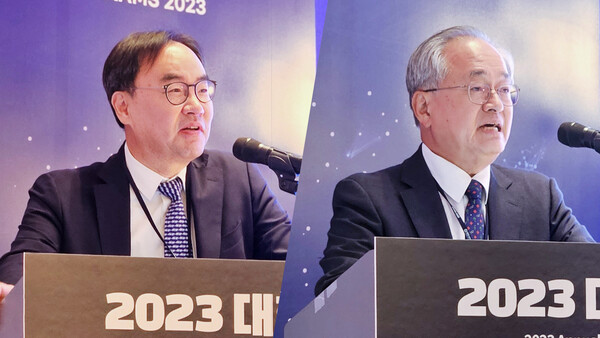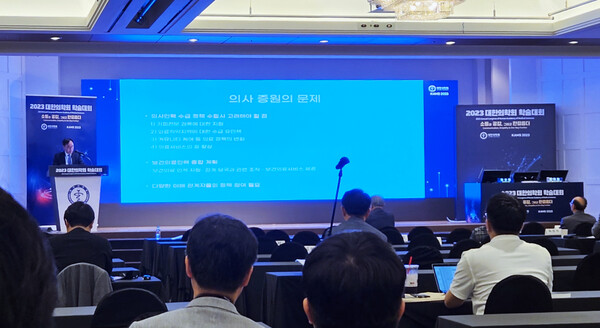
Some leaders in the medical community expressed concerns that doctors could become isolated if they "unconditionally oppose" the medical school enrollment quota and the integrated healthcare system.
"We need to work together with society and make long-term plans," they said.
Professor Lee Jin-woo, an orthopedic surgeon at Yonsei University College of Medicine and the incoming president of the Korean Academy of Medical Societies (KAMS), said so in a keynote lecture at the academy’s conference on Thursday.
To overcome increasing social pressure, the medical community must "establish a cause while making concessions," Lee emphasized.
He pointed out that the medical profession cannot refuse to discuss everything and stick to its existing position when the government and society demand an expanded role for doctors in society or an increase in the number of medical school students.
He also said that the medical community's position needed to be more logically consistent by failing to gather views from the outside.
Commenting on increasing medical school enrollment quota and establishing public medical schools, Lee said, "If doctors say they don't need more doctors and various medical departments complain of manpower shortage, the rest of society will look at doctors with confusion as to whether they want more doctors or not."
He said the issue of physician assistants adds to this confusion, narrowing the room for the medical community.
"The medical community says, ‘We can't have PAs. We must not hire more doctors. And we must do everything ourselves,’" he said. "Such logic has put the medical community on the ropes. We cannot solve the crisis in this way.”
Therefore, he said, it is necessary to discuss the policy of physician supply and demand with various stakeholders, including the government, while considering changes in medical policies, including the avoidance of difficult, low-income departments, incentives for sending doctors to vulnerable areas, community care, and improving the medical service quality.
The medical community should also revisit the issue of an integrated healthcare system, which resurfaced with the Supreme Court's ruling on the use of ultrasound diagnostic devices by oriental doctors, he said.
"More than 700 oriental doctors graduate from schools every year, and the demand for using modern medical devices is bound to increase. We need to discuss medical integration once more from the perspective of improving people's health and healthcare.” Lee said. “(Medical integration) can solve the problem of the doctor shortage to some extent. The medical community should take a more proactive stance from now on."
As a member of society, the medical profession cannot be separated from society, Lee stressed.
“Sometimes I wonder if we are sticking to our arguments,” Lee said. "A lot of knowledge does not make you an intellectual. We must create a better future through dialog with the attitude that we could be wrong."

‘All three branches of government seem to point knives at doctors’
In his opening address and keynote speech, outgoing KAMS President Choung Ji-tae said, “Indifference is a big problem," adding that the medical community needs to be more proactive in communicating and emphasizing it is a matter of “survival.”
"Since the Covid-19 pandemic calmed down, the government has reverted to pretending to communicate with the medical community. All the executive, judicial, and legislative branches seem to point knives at doctors."
Choung lamented the participation of doctors, saying, "Despite this, there are many physician organizations that do not actively participate (in the agenda) and do not blame the government or express interest in these issues. That doesn't solve anything."
“As major medical societies celebrate their 80th anniversaries, I am seriously concerned about how many will survive beyond 100 years. We all need to participate and share medical problems," he said.

